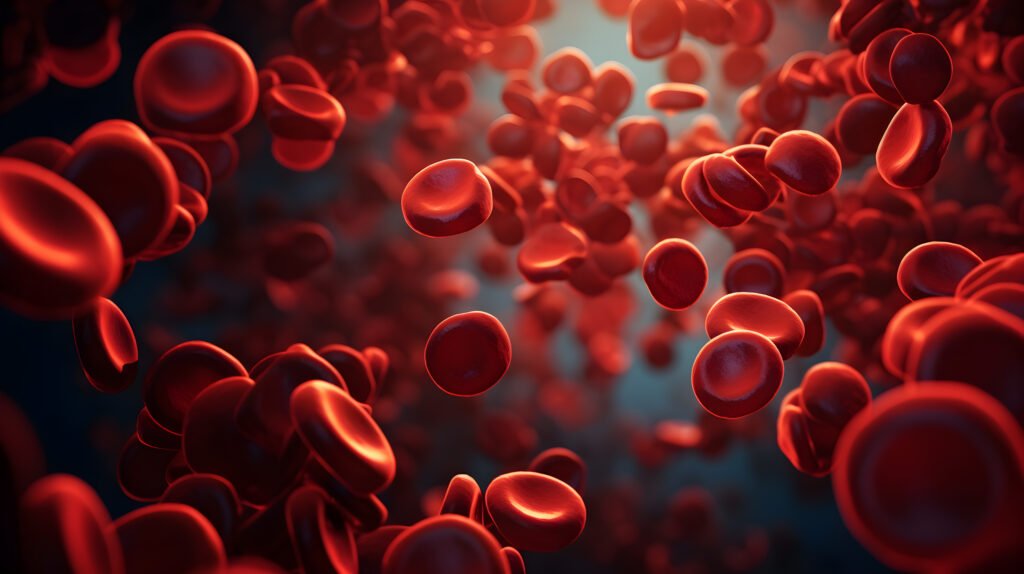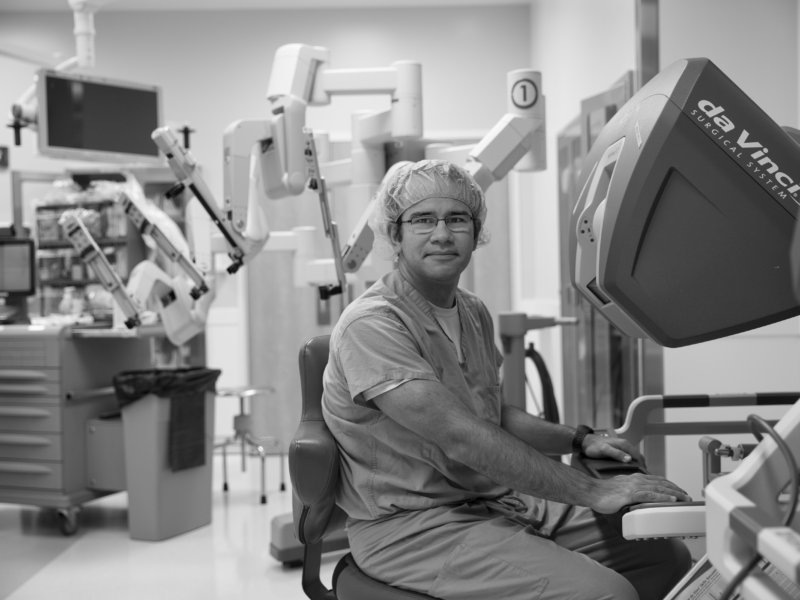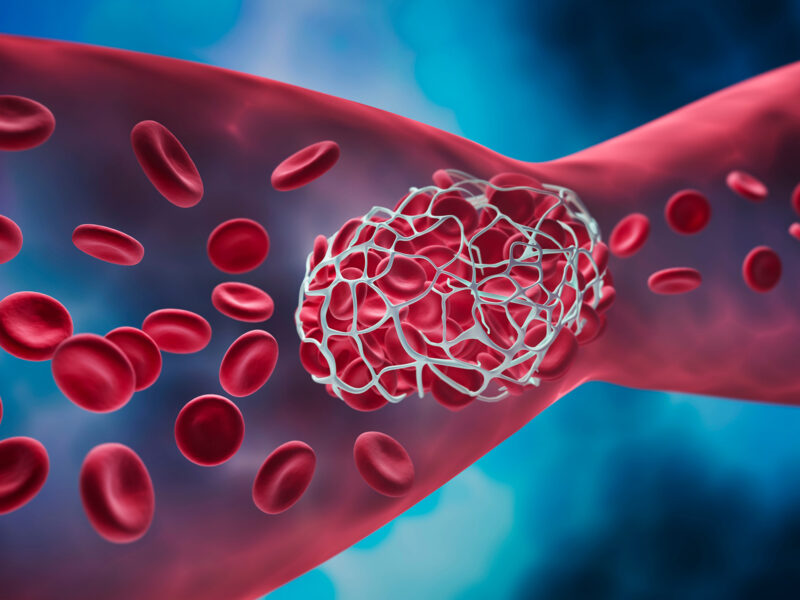Changing the Landscape of Blood Disorder Treatments: A Long Time Coming
Changing the Landscape of Blood Disorder Treatments: A Long Time Coming https://pediatricsnationwide.org/wp-content/uploads/2024/01/AdobeStock_624471053-1024x574.jpg 1024 574 Alaina Doklovic Alaina Doklovic https://pediatricsnationwide.org/wp-content/uploads/2023/11/100923RH0019-e1699635391623.jpg- February 12, 2024
- Alaina Doklovic

New therapies, from virus-mediated gene therapy to CRISPR-based treatments, are poised to change the clinical landscape of blood disorder treatments and outcomes.
For more than two decades experts have been searching for curative therapies for blood disorders. They have invested time, money and expertise to bring these therapies to fruition, something that the Division of Hematology, Oncology and Blood and Marrow Transplant (BMT) at Nationwide Children’s Hospital also strives to accomplish. Through decades of persistent clinical research on gene therapy, what researchers know about hematology and blood disorder treatments has come a long way.
The industry-led clinical trials for these novel therapies didn’t originate at Nationwide Children’s, but the hospital was a site for those large trials. Our patients who participated in those trials were part of the large effort to help bring them to approval. Now, Nationwide Children’s is one of only a handful of facilities throughout the United States that is certified to administer therapies for hemophilia, sickle cell disease and beta thalassemia, and is in the final stages of activation to be a qualified treatment center for LYFGENIA. This is a testament to Nationwide Children’s advanced facilities and hardworking, specially trained staff necessary for the administrations of these therapies.
Hemophilia
Hemophilia is an inherited blood disorder in which the blood does not clot properly because a blood clotting factor is low or missing. In hemophilia A, factor VIII (8) is missing. In hemophilia B, factor IX (9) is missing.
“We didn’t even know that hemophilia A and hemophilia B were two different conditions until the 1950s. Now, we can genotype our patients accurately. As science has progressed, we learned how to clone the Factor VIII and IX proteins, and this was a big leap forward,” says Amy Dunn, MD, director of Pediatric Hematology and the Hemostasis Treatment Center at Nationwide Children’s Hospital.
The team at Nationwide Children’s has been part of hemophilia gene therapy clinical research since 2018 when they became a clinical trial site for a gene therapy to treat hemophilia A. In just four years, the U.S. Food and Drug Administration (FDA) approved two therapies — HEMGENIX®, the first gene therapy to treat adults with hemophilia B, and ROCTAVIAN™, the first gene therapy to treat adults with hemophilia A. These one-time gene therapies are given as a single dose of a viral vector carrying a gene for clotting factor VIII and factor IX, administered intravenously. The gene is expressed in the liver and promotes the production of the factor VIII or factor IX protein, allowing the blood to clot properly and limiting bleeding episodes.
Sickle Cell Disease
Sickle cell disease (SCD) is an inherited blood disorder that affects hemoglobin, a protein that carries oxygen throughout the body. This abnormality causes red blood cells to become C-shaped, or sickled, and they become hard and sticky. This can block normal blood flow, prevent oxygen from travelling and cause other health complications including pain, infections or anemia.
“The FDA approval of two new gene therapies — CASGEVY™ and LYFGENIA™ — for sickle cell disease in December 2023 is truly historic,” says Hemalatha Rangaragan, MD, a physician in the Division of Hematology, Oncology, & Blood and Marrow Transplant at Nationwide Children’s. “CASGEVY is the first CRISPR-based therapy approved in the United States, and it is a testament to our program and expertise that we can be part of the first wave of treatments and deliver this novel therapy to patients here in central Ohio.”
With CASGEVY (also known as exa-cel), doctors will remove cells from a patient’s bone marrow, edit the affected gene with CRISPR technology and put billions of these modified cells back into the patient. The treatment is unique and customized to each patient. The hope is that this gene therapy will be a one-time treatment that will alleviate symptoms for a lifetime.
LYFGENIA (also known as lovo-cel), a cell-based therapy, works by permanently adding a beta globin gene to a patient’s own blood stem cells. Once patient blood stem cells are collected and genetically modified to produce an anti-sickling hemoglobin, they are infused back into the patient. This acts as a blueprint for all other cells to follow. This treatment will help limit the number of sickled cells that are produced and reduce vaso-occlusive events for a better quality of life.
Beta Thalassemia
Beta thalassemia is an inherited blood disorder that limits the body’s ability to produce beta-globin, a protein needed to make hemoglobin and red blood cells. Patients with transfusion-dependent beta thalassemia receive monthly blood transfusions as part of their treatment to supply red blood cells needed to carry oxygen throughout the body.
ZYNTEGLO™ is the first FDA-approved cell-based gene therapy approved for the treatment of people with beta thalassemia who require regular red blood cell transfusions. ZYNTEGLO is a one-time gene therapy administered through a single customized dose using the patient’s own bone marrow stem cells. The cells are genetically modified to allow successful production of beta-globin. This treatment would eliminate the need for monthly blood transfusions and reduce symptoms associated with this disease.
“Nationwide Children’s is a qualified treatment center for ZYNTEGLO,” says Anthony Villella, MD, a pediatric hematologist-oncologist in the Division of Hematology, Oncology & Blood and Marrow Transplant at Nationwide Children’s. “This was a tremendous team effort, made possible by so many people behind the scenes. We are excited to be able to finally offer this therapy to our patients and be a part of the transformative impact gene therapies will have for this community.”
Offering State-of-the-Art Care for Blood Disorders
Historically, patients with sickle cell disease and blood disorders have been neglected when it comes to disease awareness and research investment. After decades of research and innovation, riding on the back of milestone developments in CRISPR technology and viral-mediated gene therapy, Nationwide Children’s is honored to be a site for blood disorder patients to receive these long-awaited treatments.
“The FDA-approved gene therapies for sickle cell disease, beta thalassemia and hemophilia are currently being offered here,” says Dr. Dunn. “These therapies weren’t invented in our research labs, but we are thrilled to finally have new treatment options for people affected by hematologic conditions, allowing them to receive cutting-edge treatments at Nationwide Children’s.”
Amy Dunn, MD, is a consultant for CSL Behring, UniQure, and BioMarin. Anthony Villella, MD, is a consultant for Vertex.
Image credit: Adobe Stock
About the author
Alaina Doklovic is a Marketing Specialist for Research Communications at Nationwide Children’s Hospital. She received her BS in medical anthropology and English from The Ohio State University. Her passions for science and health, combined with her desire to help others, motivated her to pursue a career in which she could actively help improve patient outcomes and scientific research through writing.
-
Alaina Doklovichttps://pediatricsnationwide.org/author/alaina-doklovic/September 19, 2023
-
Alaina Doklovichttps://pediatricsnationwide.org/author/alaina-doklovic/January 22, 2024
-
Alaina Doklovichttps://pediatricsnationwide.org/author/alaina-doklovic/February 19, 2024
-
Alaina Doklovichttps://pediatricsnationwide.org/author/alaina-doklovic/March 19, 2024
- Posted In:
- Clinical Updates
- Features
- Research







